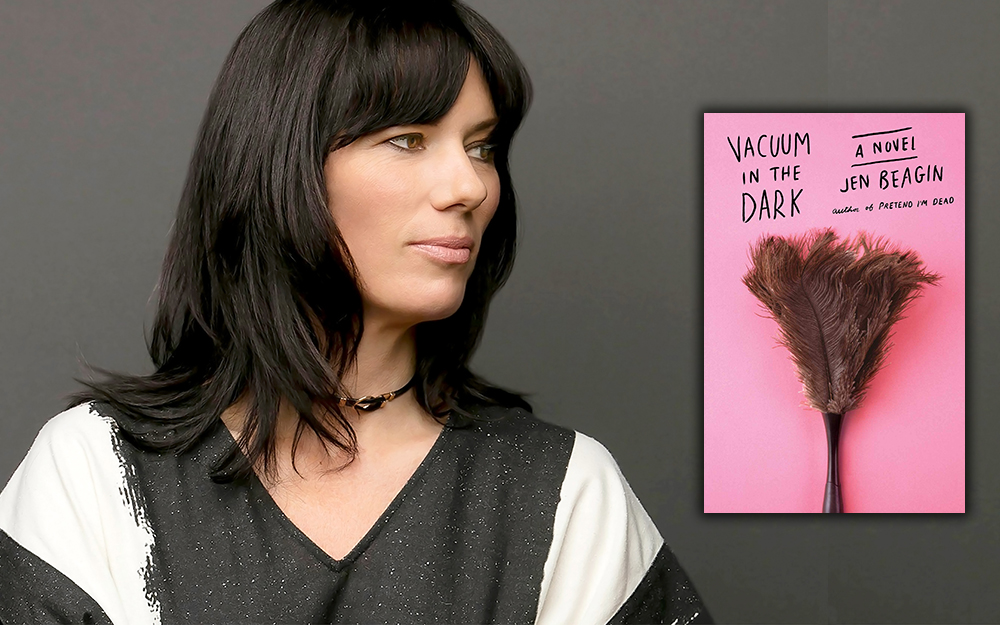
By Heidi Simmons
—–
Vacuum in the Dark by Jen Beagin – Fiction
—–
It can be hard to clean up your act when you don’t know what it is yet. The mid-twenties is a time of self-discovery, individuation and personal autonomy. In Jen Beagin’s novel Vacuum in the Dark (Scribner, 240 pages) a young woman must come to terms with her adulthood.
Mona is 26 years old and lives alone in Taos, New Mexico. She makes her living as a cleaning lady. She’s meticulous at it and takes pride in her skill set. But, to combat the boredom of her job, she takes photographs of odd household things and poses nude on her client’s furniture.
It doesn’t help that Mona has an eccentric clientele. While working for a blind therapist and her husband, she discovers unusual things around the house that fascinate her — a name secretly carved into furniture, and someone is leaving human excrement in soap dishes. Where most cleaning ladies would quit, this intrigues Mona. She enjoys considering the mystery of why and who is doing these strange and provocative things.
In her head, Mona has created a best friend with whom she regularly speaks. Her imaginary friend is wise, pragmatic and renders good advice, although Mona rarely takes it. Mona finds herself in sexually charged relationships with her clients, which creates conflict in more ways than one. The affairs are complicated and Mona prefers the women to the men.
But when Mona returns home to Los Angeles for her estranged mother’s vow-renewal ceremony, she gets a fresh perspective on her childhood, and her life as an adult.
Author Beagin writes a compelling psychological narrative about a woman who must confront her past, recognize her demons, and accept responsibility for her future. There is an authentic voice to Mona’s character. Mona is a victim, but more importantly, she is also a survivor.
I liked that Beagin does not spend too much time on the details of Mona’s childhood and young adult abuses, which are horrible. Rather, she gives the reader just enough background to let us know what shaped Mona into the brave woman she has become. Mona is bright, independent and creative. Somehow, she made it to adulthood with the odds against her. She has certainly suffered a great deal in her short lifetime.
Beagin writes with a lean clarity, sharp wit and a gifted storyteller’s insightfulness. At first, I wanted to put the book down. The poop part – the first chapter — is hard to take and seems over-the-top and gratuitous until we get to know Mona, her curiosities and creative thought processes. The sexual encounters are also very descriptive.
Although Mona is damaged, she is not self-destructive nor does she dwell on the past or blame those responsible for the dysfunction in her life. She is remarkably present. And that makes Mona a provocative and memorable character.
In fact, all of the characters in the story exhibit unique characteristics and personal damage. I especially appreciate the Yoko and Yoko couple. Mona likes to assign pseudonyms to the people in her life.
I also appreciated that, in the end, Mona figures out what is best for her. She discovers that there are people in her life who love her and genuinely care. Perhaps that’s what being an adult is all about.
Finally, Mona makes a good choice and the reader knows that her future will be rewarding and she may contribute something beautiful to the world because of her difficult upbringing. Yet, it is just as possible – and perhaps much more likely — for her to regress.
The twenties can be an ordeal for everybody as they find their own way. But being a woman from an abusive, dysfunctional family alone in the world can be even more challenging to navigate into a healthy, happy, productive adult existence.









































